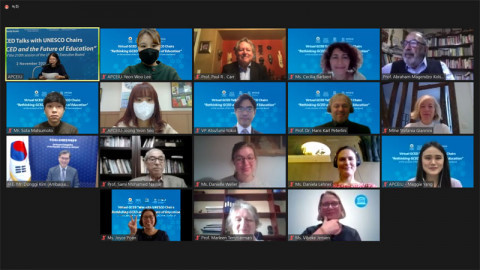
GCED Basic Search Form
Quick Search
Вы здесь
Новости

On the occasion of the 210th Session of UNESCO Executive Board Meeting, the Virtual GCED Talks with UNESCO Chairs was held under the theme ‘Rethinking GCED and the Future of Education’ on Monday, 2 November 2020.
The event was organized by the Permanent Delegation of the Republic of Korea to UNESCO, in collaboration with the Group of Friends for Solidarity and Inclusion with Global Citizenship Education (Afghanistan, Armenia, Austria, Bangladesh, Colombia, Italy, Jordan, Kenya, Kuwait, Philippines, Republic of Korea, Senegal, and Serbia), UNESCO and APCEIU.
The Talks successfully facilitated a wide-ranging dialogue among the distinguished panelists consisted of six UNESCO Chairs and professors in GCED-related areas, such as human rights, peace, sustainable development, gender equality, and cultural diversity. The panelists also represented six different regions across the globe: Africa, Arab-States, Asia, Europe, Latin America, and North America. The event served as a momentum to address the current situation and challenges faced by different regions around the world amid the pandemic and to explore untapped resources and ideas for collective and transformative actions to tackle those challenges.
The Talks was opened by the Ambassador and the Permanent Delegate of the Republic of Korea to UNESCO and Chair of the Group of Friends for Solidarity and Inclusion with Global Citizenship Education, H.E. Mr Kim Dong Gi. Ambassador Kim Dong Gi stated that GCED is the most effective way to build defenses of peace in the minds of men and women, especially during this time of pandemic when racism and discrimination are aggravated. The Ambassador also briefly introduced the Group of Friends for Solidarity and Inclusion with GCED in which APCEIU contributed to its launch in May 2020.
The speech was then followed by the opening remarks of Madame Stefania Giannini, Assistant Director-General for Education of UNESCO. While reaffirming the significance of GCED, Madame Stefania Giannini reminded the participants of UNESCO's efforts to enhance ‘Education for All’ and highlighted the role of young people in making changes in society as they are the future leaders of this planet.
Following the inspirational opening remarks, the panel discussion was initiated by the moderator, Ms Cecilia Barbieri, Chief of the Section of Global Citizenship and Peace Education, Division for Peace and Sustainable Development of UNESCO. The list of the distinguished panelists of the discussion is as follows:
- Prof. Marleen Temmerman (Aga Khan University, Kenya) - UNESCO Chair on Youth Leadership in Science, Health, Gender and Education
- Prof. Sami Mohamed Nassar (Cairo University, Egypt) - Professor of Education, Graduate School of Education, Cairo University
- Prof Atsufumi Yokoi (Okayama University, Japan) - UNESCO Chair in Research and Education for Sustainable Development, Vice President for Global Engagement Strategy of Okayama University
- Prof. Dr. Hans Karl Peterlini (Alpen-Adria-Universitat Klagenfurt, Austria) - Professor of Intercultural Education and Head of the Austrian Course in Global Citizenship Education
- Prof. Abraham Magendzo Kolstrein (Universidad Academia de Humanismo Cristiano, Chile) - UNESCO Chair in Human Rights Education
- Prof. Paul R . Carr (Universite du Quebec en Outaouais, Canada) - UNESCO Chair in Democracy, Global Citizenship and Transformative Education
Three key guiding questions were presented to engage the panelists on the discussion around the idea of envisioning the future of GCED. The questions that were posed during the panel discussion encompassed a broad range of ideas from the current situation in the context of the COVID-19 pandemic to strategic directions of UNESCO in the upcoming future.
Based on the questions above, the panelists exchanged their thoughts on various topics including but not limited to rights to education, social injustice, widened social gap, equal access to the public health system for girls, digital divide, and planetary ethics.
During the panel discussion, participating students from the UNESCO Chair-hosting universities also had the opportunity to raise their questions regarding the pertinent issues within the unprecedented crisis such as the new learning environment of universities, the role of education as a tool to navigate the societal panic, and teachers’ impartiality under the huge influence of social media and mass information. The youth’s engaging questions and the panelists’ insightful responses based on their interdisciplinary knowledge and experiences have further enriched the quality of the discussion and provided fresh points of view that can be reflected by the participants throughout and beyond the Talks.
The Talks was wrapped up with a closing remarks by Mr Lim Hyun Mook, Director of APCEIU. Expressing his sincere gratitude towards all the distinguished speakers and panelists, he reiterated the role of GCED in tackling problems such as hate, discrimination and extreme violence that are exacerbated amidst the COVID-19 pandemic. He further pledged APCEIU’s unwavering support for the realization of GCED in the region and beyond.
URL:
